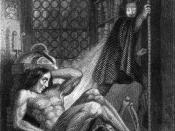Romanticism was a literary, intellectual, and artistic movement which began in the second half of the 18th century in Western Europe and gained strength during the European Industrial Revolution. During this period, writers turned inward rather than outward toward the external world, to reflect on issues of the heart and imagination. People during the Romantic era emphasized intuition, imagination, and feeling. Many people of the Romantic era enjoyed Gothic literature which included stories of the hysterical, mystical, and passionate adventures of terrified heroes and heroines in the clutches of frightening, unexplainable forces. Mary ShelleyÃÂs Frankenstein was a classic Gothic novel made in the Romantic era that associated many of the aspects of romanticism. (MacLean 1) Characters in Frankenstein, such as Henry Clerval, illustrated a potent romantic mindset. Furthermore, a common characteristic in romanticism, the reflection on inner feelings, was also pervasive in the novel in FrankensteinÃÂs character, especially after he got beaten by Felix.
Mary ShelleyÃÂs novel Frankenstein was representative of romanticism in many different aspects and consisted of many apparent romantic ideals.
Henry Clerval was a character that illustrated a potent romantic mindset in Frankenstein. Henry Clerval was calm, innocent, and poignant when Victor was having a nervous breakdown; they were very opposite people and Shelley made it this way to show a sharp contrast between the romantic and the gothic characters. Victor expresses his delight in seeing Henry and says that it made him think of his family back home: ÃÂNothing could equal my delight on seeing Clerval; his presence brought back to my thoughts my father, Elizabeth, and all those scenes of home so dear to my recollection. I grasped his hand, and in a moment forgot my horror and misfortune; I felt suddenly, and for the first time during many months, calm and serene joy.ÃÂ...


